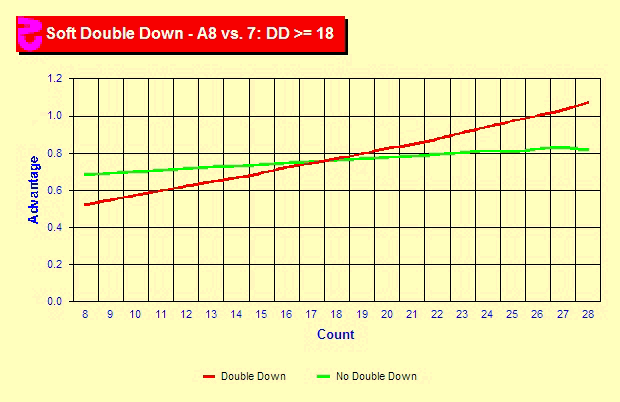Ferretnparrot
Well-Known Member
Iv been very curious about deviations ivolving mostly soft 19s but i dont think its too far fecthed to think that soft 20s may be included in this also.
Its been an established fact that at certain counts it is beneficial to double 9 vs 7 and 8 however a soft 19 has no index numbers for soft doubling above 6 i find this curious as all of the final hands would be the same as doubling a 9 except for when you draw a 2 it would give you a total of 21, so doubling a soft 19 will give you better chances of drawing to sums of 21 and the exact same chances of every other hand that you would get for doubling a hard 9, all while the same math applies to the dealers showing card. I understand that 19 is a moderatly strong hand not to be touched but its known that 18 will lose more hands than it wins, and 19 is only one above that, i dont think the idea that there may be a playable index number for doubling soft 19 against a 7 or 8 is too far fetched, posibly even for soft 20 also.
Does anybody have the tools to figure that out?
Soft 18s??
Its been an established fact that at certain counts it is beneficial to double 9 vs 7 and 8 however a soft 19 has no index numbers for soft doubling above 6 i find this curious as all of the final hands would be the same as doubling a 9 except for when you draw a 2 it would give you a total of 21, so doubling a soft 19 will give you better chances of drawing to sums of 21 and the exact same chances of every other hand that you would get for doubling a hard 9, all while the same math applies to the dealers showing card. I understand that 19 is a moderatly strong hand not to be touched but its known that 18 will lose more hands than it wins, and 19 is only one above that, i dont think the idea that there may be a playable index number for doubling soft 19 against a 7 or 8 is too far fetched, posibly even for soft 20 also.
Does anybody have the tools to figure that out?
Soft 18s??
Last edited:

